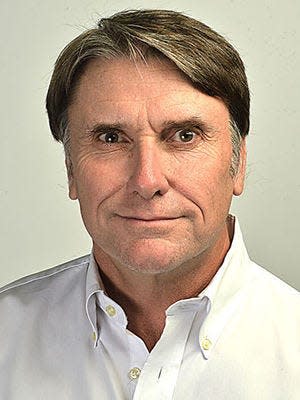Politician ready to fix education with incorrect history
In the critical work of educating our children, we obviously want to put our trust in those who not only have been highly trained in their particular areas of expertise, but understand pedantic structures that allow them to effectively confer that expertise on the young people of America — in other words, our nation’s politicians.
“School teachers” have imprinted dangerous ideas in the minds of our children, such as tolerance of various races and Dan Snyder.
Fortunately, politicians are rising to the challenge, including Virginia freshman Republican Wren Williams, who introduced legislation that would require schools to teach history as he sees it. Prohibited would be “divisive” topics. Allowed would be, according to the bill, founding documents such as the Declaration of Independence and “the first debate between Abraham Lincoln and Frederick Douglass.”

Brilliant. At least, and this should be viewed as progress, Wren acknowledges that Frederick Douglass is dead, something not understood by a certain past president. And frankly, if you’ve heard one Douglas(s) you’ve heard them all.
As for the rest of Wren’s history of America, it begins at Lexington and Concord, a famous grape growing region, where soldiers sat around the vineyard and did the first shots of the Industrial Revolution.
The cause of our Founding Fathers gained momentum when George Jefferson wrote the Declaration of Independence, after which he led the charge at Bunker Hill where he uttered the famous words, “Don’t fire until you see the Whites.”
For a while it looked bad for our side, but the tide of battle turned in the Americans' favor at the Battle of Sarasota in which the British landed on the beach and became heavily engaged with colonists over who would get first seating at the early-bird special at Denny's.
More Tim: This isn’t health guidance; this is rock, paper, scissors
Pete Waters: Humanity — a lost cause or is there hope?
Lisa Prejean: Why is it important to face our fears?
But our brave troops prevailed, even after a terrible winter at Valley Mall, leading to the surrender of Lord George Wallace at Yorktown, future home of the Yankees.
To drum up support for our new government, Alexander Hamilton, John Jay and James Madison wrote the Pentagon Papers explaining our Constitution, which created the three branches of government, including the Legislative, the Executive and the Santa Maria, along with the 10 Commandments, which protect our right to build a bridge.
Eventually, the Wild West was settled by John Wayne, who drove a covered wagon on the Appalachian Trail and defeated the Indians at the Battle of Little Bigfoot. Settlers followed, building homesteads for themselves, barns for their cattle and chicken houses that had been invented by C. Everett Coop.
But tensions were already flaring, as evidenced by passage of the Kansas-Nebraska Act, which was won by Nebraska 34-31 on a late field goal by the “Oracle of Omaha,” Jimmy Buffett.
This led to the Civil War, which was caused by everything except slavery and pitted Bruce E. Lee and Michael “Stonewall” Jackson against John Hancock and Cary Grant. After the South won the war at the Second Battle of Bull Durham, the Confederates graciously turned all their weapons over to the North and invited them to come on down and run their government.
After the war, we got back to commercial and scientific pursuits, as William Perry discovered the North Pole and in so doing earned his nickname “The Fridge.” Of course there were setbacks, such as the Titanic, which sank after striking Rob Gronkowski.
Even worse, Wall Street collapsed, leaving a big hole in the middle of New York City that became known as the Great Depression.
Fortunately we elected Franklin Roosevelt who founded the television game show "Deal or New Deal" and dug the Suez Canal so ships would no longer have to go all around the Cape of Good Horn.
Despite all the election hullabaloo, we are in great position to succeed as a country. And if we don’t, we’ll just write a history that says we did.
Tim Rowland is a Herald-Mail columnist.
This article originally appeared on The Herald-Mail: The great, mythical debate of Frederick Douglass and Abraham Lincoln
